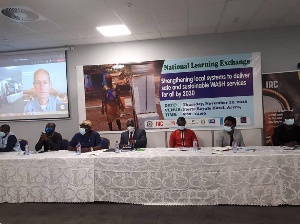Dr. Kodjo Mensah-Abrampa, the Director-General of the Ghana National Development Planning Commission (NDPC) has urged districts across the country to learn from each other's experiences and successes to ensure sustainable development.
Dr. Mensah-Abrampa, who was speaking at a national learning exchange programme on innovative Water and Sanitation Hygiene (WASH) practices in Accra, said the NDPC saw great value in the ability of districts to learn from one another.
He said for Ghana to achieve the Sustainable Development Goal (SDG), particularly the sixth, which ensured the availability and sustainable management of water and sanitation for all by 2030, districts must begin to act differently in terms of their implementation of WASH strategies.
He said the NDPC, IRC Ghana, and other partners, had therefore organised the learning experience, to highlight the successes and challenges of some three selected WASH model districts, Bongo, Wassa East and Asutifi North.
Dr. Mensah-Abrampa said the Commission brought together participants, including District Chief Executives, representatives from District Assemblies, and NGOs from 13 selected districts to discuss the study outcome of the model districts, so they could replicate the successes in their localities.
The selected districts include Bia East, Krachi East, Lower Manya-Krobo, Adansi Asokwa, Nanumba South, Affutu, Sekyere Kumawu, Kwahu Afram Plains, Ketu South, Tolon, Akatsi South and Akatsi North.
He said although Ghana's development aspirations were aligned with the 2030 global agenda for Sustainable Development and SDGs, achieving Goal 6, had remained a great challenge.
Available data showed that in 2017, 19 percent of the population did not have access to at least a basic level of water services, and only 36 percent were using safely managed water accessible on their premises.
He said at the same time, almost one in five (18 percent) of the population was also still practising open dedication.
Dr. Mensah-Abrampa explained that between February and March 2020, a team from the NDPC and IRC Ghana visited the three model district to collect and document case studies within the WASH sector, share best practices, and lessons to contribute further to evidence-based innovative development approaches towards meeting the SDGs 6 in Ghana.
It was noted that effective WASH services were a source of resilience for communities, especially in the era of the COVID-19 outbreak, saying the pandemic highlighted the importance of WASH, especially hygiene as an essential protection against the virus.
He indicated that although the districts had done very well in terms of expanding their provision of water for the population, there existed some challenges with sanitation and hygiene as people still open defecate, while there were concerns about the quality being consumed by households with their personal sources of the commodity.
He cited other challenges such as the lack of capacity, tools, tool kits and facilitation, and urged districts to focus on putting in place an elaborate WASH Plan to ensure their automated budgets were approved for the implementation of these projects.
Dr Abrampa-Abrampa indicated that the successes chalked by these districts, the shared impute by the participants would form an important source of information to be incorporated into Medium Term Framework that was being developed by the Commission.
He assured stakeholders of the Commission's collaboration with the districts and community Champions to accelerate progress towards scaling up WASH services.
Dr Felix Addo-Yobo, the Director of the Development Policy Division, NDPC, said things needed to be done differently to achieve the expected quality outcome in the WASH sector.
Ms. Patience Ampomah, the Planning Analyst, in a presentation, noted that some of the factors that accounted for the successes in the three districts included identification of WASH as a priority issue and addressing it energetically and realistically.
Again the districts they collaborated with implementing partners, provided community leadership, ensured staff motivation, and insisted on good maintenance of the facilities among others, and ensured they owned the projects.
He urged the other districts across the country to emulate these successes and best practices and use the lessons to plan their WASH programmes for 2021 to meet the 2030 global target.
Regional News of Friday, 13 November 2020
Source: GNA













